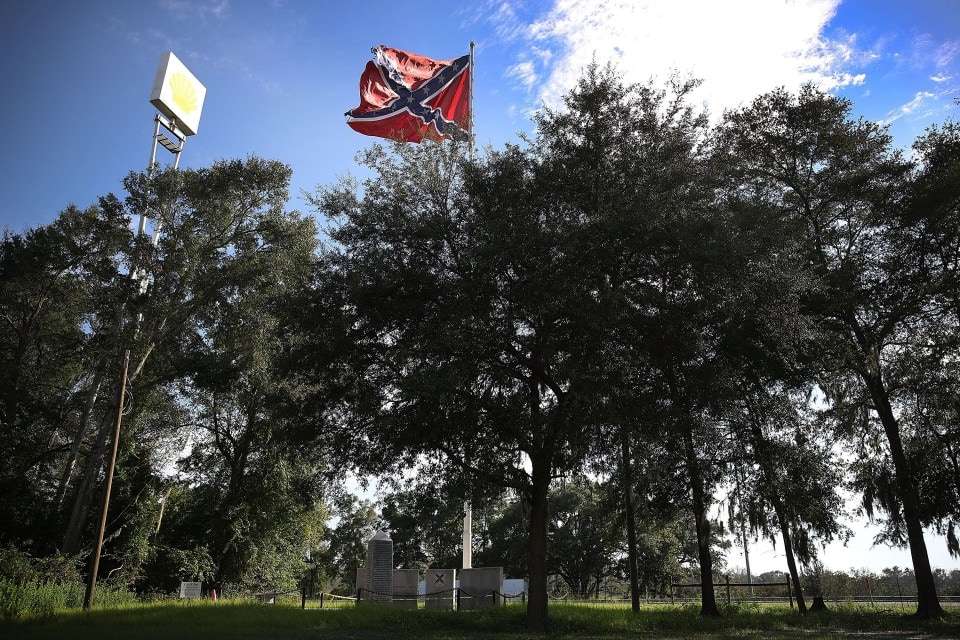The Volokh Conspiracy
Mostly law professors | Sometimes contrarian | Often libertarian | Always independent
1961 Florida law banning 'cast[ing] contempt upon the flags of the Confederacy … for crass or commercial purposes'

Tillett v. BJ's Wholesale Club, Inc. (M.D. Fla.) is a 2010 decision, but it appeared just a few weeks ago on Westlaw, and so had gone largely unnoticed. Bobby Tillett, who worked for a warehouse run by BJ's Wholesale Club, " 'routinely displayed replicas of the Confederate battle flag' on his vehicle while parked in the Warehouse employee parking lot." BJ's ordered him not to do that, which led Tillett to park his car off premises, more than a mile away. This apparently caused a controversy, which led BJ's to release this statement to media outlets:
Like all employers, we have guidelines of appropriate personal behavior and expression at work. While the policy does not identify any specific type of expression, it generally prohibits expression that is rude, abusive, hostile or intimidating. Under these guidelines, we asked this team member to not display the confederate flag in our parking lot. We are confident that we have struck the right balance for all of our team members and their work environment.
One of BJ's managers also allegedly "stated in the presence of several [of Defendant's] employees that the [Confederate] Flag is a racist symbol and that those who display it are racists."
One day the following year, Tillett called in sick, allegedly " 'within the time frame designated for such matters,' as he had done on many previous occasions during the course of his employment. Citing a rule that required a worker calling in sick to do so before his or her shift began, Defendant terminated Plaintiff's employment. Prior to his termination, Plaintiff had never heard of such a rule, and several of his coworkers told him that they too had 'never heard of or followed any such purported rule.' " Tillett then sued, among other things, for violation of Fla. Stats. sec. 256.10; and on the theory that he was fired (in violation of Florida's Whistleblower Act) for refusing to participate in BJ's violation of Fla. Stats. sec. 256.10. And Fla. Stats. sec. 256.10 is a doozy: Enacted in 1961, it provides that
No person shall publicly mutilate, deface, defile, defy, trample upon, or by word or act cast contempt upon the flags of the Confederacy, or replicas thereof, for crass or commercial purposes.
The court disagreed with Tillett. The statute itself, the court says, doesn't provide a civil cause of action, and the Whistleblower Act was inapplicable here.
First, the Whistleblower Act applies only to people fired for objecting to a violation of the law, or refusing to participate in it - and though Tillett objected to BJ's condemnation of the flag in its media statement,
[T]here is no allegation that Plaintiff ever objected to or refused to participate in the media statement itself. Indeed, although the facts alleged might support the plausible inference that Plaintiff was discharged because of a disagreement between himself and his employer concerning the Confederate Flag, they also demonstrate that the May 1, 2008 media statement was the product, not source, of this underlying disagreement. However Plaintiff may have subjectively perceived the media statement, he fails to allege any facts to plausibly suggest that he either "[o]bjected to, or refused to participate in" its release.
Second, the press release didn't violate the law, because
[T]he statute could not constitutionally be applied to prohibit the conduct to which Plaintiff purportedly objected. See Street v. New York (1969) (overturning conviction under statute making "it a misdemeanor 'publicly (to) mutilate, deface, defile, or defy, trample upon, or cast contempt upon either by words or act (any flag of the United States)' " and holding that the statute "was unconstitutionally applied in appellant's case because it permitted him to be punished merely for speaking defiant or contemptuous words about the American flag"); see also United States v. Eichman (1990) (holding "prosecution for burning a United States flag in violation of the Flag Protection Act of 1989" unconstitutional under First Amendment); Texas v. Johnson (1989) (holding Texas statute criminalizing the desecration of venerated objects was unconstitutional as applied to individual who "publicly burn[ed] an American flag as a means of political protest").
[Footnote moved:] Florida Statutes section 256.10 is qualified by the restrictive phrase "for crass or commercial purposes[.]" The parties dispute whether the media statement satisfies this requirement. The Court need not address the precise argument because, as previously discussed, irrespective of the reach of the statute, it may not be constitutionally applied to prohibit the conduct at issue. … Assuming [for the sake of argument] that, for constitutional purposes the media statement was "commercial" speech, it does not change the outcome as applied to the facts here alleged. "Commercial speech … is undeniably entitled to substantial protection under the First and Fourteenth Amendments of the United States Constitution. … [T]he government may ban commercial speech that is more likely to deceive the public than to inform it, or commercial speech that is related to illegal activity," but "[i]n most other contexts, the First Amendment prohibits regulation based on the content of the speech."
Sounds quite right to me.


Show Comments (0)